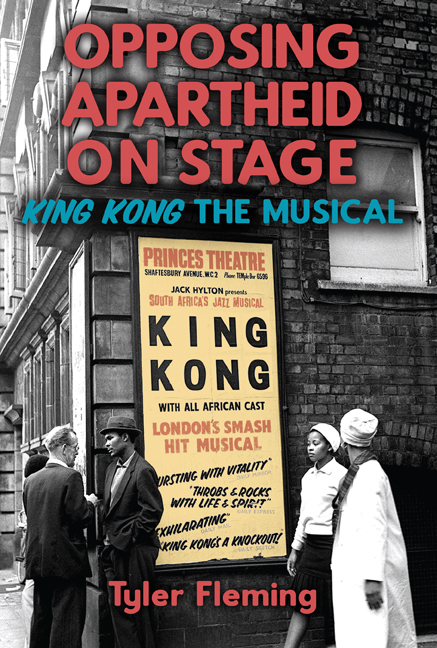Book contents
- Frontmatter
- Dedication
- Contents
- Acknowledgments
- Introduction
- 1 “Marvelous Muscles”: A History of Ezekiel Dlamini, the Real King Kong
- 2 Creating a “Back of the Moon”: The Union of Southern African Artists and Interracial Collaboration behind the “All-African” Musical
- 3 “Quickly in Love”: Popular Reception of the 1959 King Kong and Entertaining the Possibilities of a Different South Africa(s)
- 4 “Kwela Kong”: The Trials and Tribulations of a South African Musical Abroad in 1961
- 5 “Sad Times, Bad Times”: Issues of Exile, the King Kong Cast, and South African Jazz in Britain, 1961–1980
- 6 “The Boy's [and Girl’s] Doin’ It”: Moving to America and Rediscovering Africa, 1960–1989
- 7 “Death Song”: The 1979 Remake of King Kong and the Power of Cultural Memories under Apartheid
- Notes
- Bibliography
- Index
- Rochester Studies in African History and the Diaspora
- Frontmatter
- Dedication
- Contents
- Acknowledgments
- Introduction
- 1 “Marvelous Muscles”: A History of Ezekiel Dlamini, the Real King Kong
- 2 Creating a “Back of the Moon”: The Union of Southern African Artists and Interracial Collaboration behind the “All-African” Musical
- 3 “Quickly in Love”: Popular Reception of the 1959 King Kong and Entertaining the Possibilities of a Different South Africa(s)
- 4 “Kwela Kong”: The Trials and Tribulations of a South African Musical Abroad in 1961
- 5 “Sad Times, Bad Times”: Issues of Exile, the King Kong Cast, and South African Jazz in Britain, 1961–1980
- 6 “The Boy's [and Girl’s] Doin’ It”: Moving to America and Rediscovering Africa, 1960–1989
- 7 “Death Song”: The 1979 Remake of King Kong and the Power of Cultural Memories under Apartheid
- Notes
- Bibliography
- Index
- Rochester Studies in African History and the Diaspora
Summary
On February 2, 1959, an “all-African jazz opera,” King Kong, premiered at Johannesburg's University of the Witwatersrand. All under one roof, a multiracial audience sat watching a musical production featuring the country's top African performers. The audience included the likes of the Johannesburg mayor, the chair of the Anglo- American Mining Corporation, and Nelson and Winnie Mandela. The King Kong musical was unlike anything the city or the country had seen before, as it featured a “who's who” of black South Africa's preeminent performers like the Manhattan Brothers, Miriam Makeba, Mackay Davashe, and Kippie Moeketsi as well as many young future stars like Hugh Masekela, Jonas Gwangwa, Letta Mbulu, Abigail Kubeka, and Ken Gampu. With its African cast, orchestra, composer, and storyline, King Kong was indeed “all African,” but it was also integrated in that its directors, producers, creators, and organizers were almost exclusively white. King Kong was the result of herculean interracial collaboration on a scale that South African show business had never before witnessed.
One may suspect that a production of this nature simply could not happen over a decade into the apartheid era, which began in 1948, let alone be popular in such a divided country. One expects that the apartheid government and local authorities would have tried to stop it and that white South Africans would have avoided anything to do with the musical, especially as it was staged in front of integrated audiences. Instead, King Kong received widespread acclaim and adulation. Perhaps agreeing on nothing else, audiences overwhelmingly celebrated this production. For months straight, the South African press reported on the play, the directors, the cast, the musicians, and the action behind the scenes. By the end of the domestic run in late 1959, between 120,000 and 200,000 South Africans were estimated to have seen the play, but King Kong's reception and impact went beyond just the theater. White children lined up by the stage door to get the African performers’ autographs. Folks talked incessantly about the play in their workplaces. The King Kong LP became a standard in record collections throughout the country regardless of race, region, or ethnicity, and it could be heard in shebeens, nightclubs, and homes across the country.
One could almost be forgiven for thinking that an interracial production receiving such near-universal praise could only be possible in the postapartheid era.
- Type
- Chapter
- Information
- Opposing Apartheid on StageKing Kong the Musical, pp. 1 - 19Publisher: Boydell & BrewerPrint publication year: 2020



